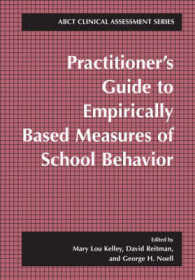- ホーム
- > 洋書
- > 英文書
- > Philosophy
Full Description
The first work to offer a comprehensive pragmatist anthropology focusing on sensibility, habits, and human experience as contingently yet irreversibly enlanguaged.
Human Landscapes works out a pragmatist anthropology which the Classical Pragmatists never put together in a comprehensive form-despite the many insights on the topic to be found in Dewey's, James's, and Mead's texts. Roberta Dreon retrieves and develops this material in its astonishing modernity concerning current debates on the mind as embodied and enacted, philosophy of the emotions, social theory, and studies about the origins of human language. By assuming a basic continuity between natural developments and human culture, this text highlights the qualitative, pre-personal, habitual features of human experience constituting the background to rational decision-making, normativity, and reflection. The book rests on three pillars: a reconceptualization of sensibility as a function of life, rather than as a primarily cognitive faculty; a focus on habits, understood as pervasive features of human behaviors acquired by attuning to the social environment; and an interpretation of human experience as "enlanguaged," namely as contingently yet irreversibly embedded in a linguistic environment that has important loop effects on human sensibility and habitual conduct.
Contents
Acknowledgments
1. Introduction: A Pragmatist Approach to Human Nature
2. Looking at Human Sensibility through a Pragmatist Lens
3. Pragmatist Contributions to a Theory of Emotions
4. Humans Are Bundles of Habits
5. Human Experience as Enlanguaged Experience
6. Exploring the Continuity between Sensibility and Language
Conclusion: A Pragmatic/Pragmatist Balance
Notes
References
Index








